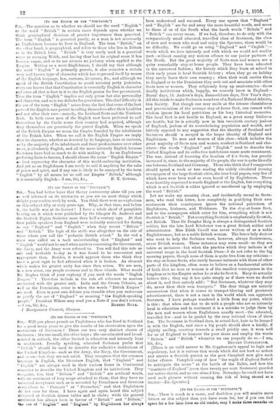[TO THE EDITOR 07 TUE " SPECTATOR."]
Ems---The question as to whether we should use the word " English " or the word " British " in certain cases depends upon whether we think geographical divisions of greater importance than generical. The term " English " is generical purely, as a man is not necessarily an Englishman because he lives in England. The term "British," on the Gther hand, is geographical, and refers to those who live in Britain or in the British Isles. " British " is very rarely used in a generical sense as meaning Welsh, and having thus lost its original sense it has become vague, and so its use arouses no jealousy when applied to the Empire. Writing as a mere Englishman, I should say that although the word " English " is primarily generic, it also connotes a certain very well-known type of character which has expressed itself by means of the English language, law, customs, literature, &c., and although we speak of the British Constitution to avoid arousing petty jealousies, every one knows that that Constitution is essentially English in character and owes all that is best in it to the English genius for free government. Thus tho term " English " implies not only genus but also personality and character, and so is too definite forgonoral use. Tho chief difficulty in the use of the term " English " arises from the fact that some of the best parts of the English race persist in calling themselves after their localities and not after their race—namely, the Lowland Scots and tho Northern Irish. In both eases men of tho English race have preferred to call theinsclves by the Gaelic name their country had acquired, although they themselves are generically the purest English. When we speak of the British Empire we mean the Empire founded by the inhabitants of the British Isles. When we call it the English Empire we imply that its character, whether as denoted by its language, laws or customs, or by the majority of its inhabitants and their predominance over other races, is absolutely English, and all the more intensely English because Beetsmen have had so much to do with making it. As an Englishman preferring facts to fancies, I should choose the name "English Empire" as Lest expressing the character of this world-embracing institution. And yet as an Englishman I am ready to call it anything for the sake of peace and quiet, and if any one is likely to be annoyed by the term " English " by all means let us call our Empire "British," although it is essentially English.—I am, Sir, &c., P. T. GODSAL.










































 Previous page
Previous page